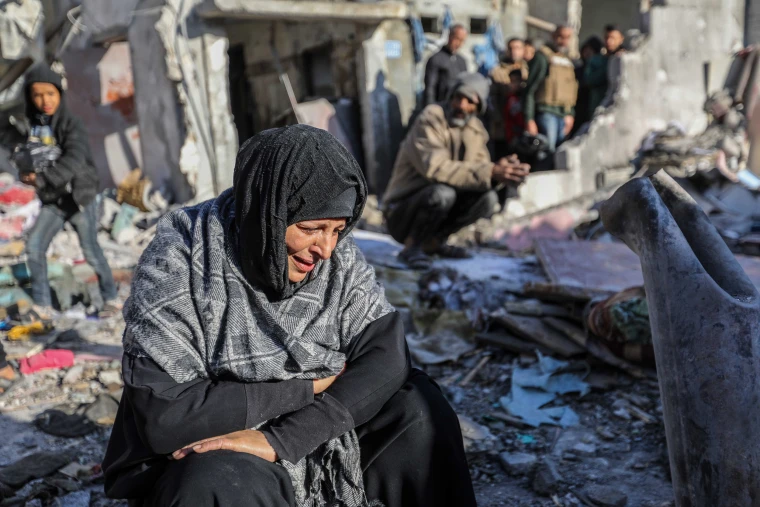22
WNAM REPORT: Pakistan has challenged Israel’s claim that its recent military assaults have changed the face of the Middle East, asserting that the region’s “soul” remains unaffected and that Arab and Muslim peoples will not relent in their quest for the right of Palestinian people to self-determination and statehood.
“Israel has not – and cannot- change its (Middle East’s) soul,” Ambassador Munir Akram, permanent representative of Pakistan to the United Nations, told the UN Security Council, referring to Israeli Prime Minister Benjamin’s Netanyahu’s proclamation of having changed the face of the Middle East.
Speaking in a debate on the situation Middle East, held under Algerian presidency, the Pakistani envoy said the region’s soul will continues to seek justice as well as peace.
“Even in this altered strategic landscape,” he added, “the Arab and Muslim peoples will not relent in their quest for peace with justice and for equal rights for the Palestinian people, including their right to self-determination and statehood.”
UN Secretary-General Antonio Guterres opened the debate which took place against the backdrop of Sunday’s temporary ceasefire in Gaza, the end of hostilities in Lebanon sparked by Israeli attacks, and the fall of the Assad regime in Syria.
“We have a responsibility to help make sure the people of the Middle East come out of this turbulent period with peace, dignity and a horizon of hope grounded in action,” he said, speaking fresh from a visit to Lebanon.
The UN chief said that the Gaza ceasefire and hostage release deal “offer a ray of hope.”
The first phase of the agreement went into effect on Sunday, with Hamas releasing three women hostages and Israel releasing 90 Palestinian prisoners.
“While many challenges lie ahead, we should appreciate the long-overdue relief this moment provides for Palestinians in Gaza and the hostages reunited with their loved ones,” Guterres said.
In his remarks, Ambassador Akram voiced Pakistan’s hope that all stages of the ceasefire agreement will be fully implemented and that the ceasefire will become permanent, and he went on to call for reviving the two-State solution leading to the establishment of a Palestinian State,
“We are concerned by Israeli threats to resume its military attacks in Gaza,” the Pakistani envoy said, hoping also that the Palestinians will be able to agree on arrangements for Gaza’s inclusive effective governance.
The international community, he said, must now urgently address the humanitarian crisis created by Israel’s destruction, its blockade of Gaza, and its deliberate strategy of starvation of its population, with all crossing points opened for all UN and other humanitarian agencies to provide humanitarian sustenance to the suffering Palestinians in Gaza.
“Israel’s attempts to shutdown UNRWA, the Agency which provides a critical lifeline to the Palestinians, must be vigorously opposed by the Security Council and the international community,” Ambassador Akram said, while assuring that on its part, Pakistan will assist the besieged people.
The displaced Palestinians must be enabled to return to their homes, including in North Gaza, and Israel must be obliged to withdraw its forces from the enclave as envisaged in the ceasefire agreement.
He called on the international community to help the Palestinians develop a concrete plan for Gaza’s reconstruction and for its expeditious implementation.
The Security Council must also work to restore international legitimacy and sustainable peace – in Palestine and the wider Middle East, ensuring accountability for the Israeli war crimes.
“The most critical step in building sustainable peace is the revival of the political and diplomatic process to achieve a two-State solution between Israel and the Palestinian people” based on the right of the Palestinian people to self-determination and the non-acquisition of territory by the use of force, the Pakistani envoy said.
The two-State solution, he said, remains the most promising, equitable and feasible framework for durable peace between Israel, the Palestinians and the Arab and Muslim world.
“Indeed, Israel’s existence, flowing from General Assembly resolution 181, can be legitimized only if there exists a separate and sovereign Palestinian State.
“The alternative is prolonged and brutal military occupation, revived violent resistance and perpetual conflict in the Holy Land, which would continue to afflict the entire Middle East and poison the relations between Israel and the Arab and Muslim world.”
Pakistan, he noted, will work to promote such a solution as a member of the ‘Global Alliance for Implementation of the two-State Solution’.
The State of Palestine, he added, must be recognized by all UN Member States and admitted as a full member of the United Nations.
Ambassador Akram also welcomed the agreement, facilitated by France and the U.S., for a cessation of hostilities in Lebanon, while calling on Israeli forces to withdraw from South Lebanon within the stipulated 60 days. “Israel must halt its continuing attacks on Lebanon which are blatant violations of the 26 November agreement on cessation of hostilities.”
Pakistan, he said, supports the stabilization of Syria through an inclusive political process and governance, underscoring that terrorism must not be allowed to reemerge in or from that country. “Israel must withdraw immediately from the separation zone established under the 1974 Disengagement Agreement; It must also withdraw from the occupied Syrian Golan Heights in accordance with Security Council resolutions”.
The Pakistani envoy also called for a halt to the Israeli and other air strikes against Yemen as well as an end to the attacks from Yemen on international shipping.
The Security Council, he said, must also be concerned at the reported contemplation of further Israeli attacks against Iran. “Today, despite the hostile rhetoric, there is an opportunity to revive the JCPOA (Iran nuclear deal) on equitable terms,” he said, adding such a move would contribute to realizing durable peace and security across the Middle East.


